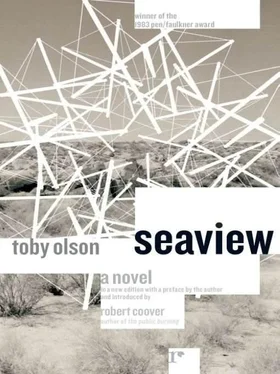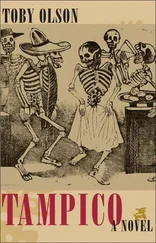He stirred his coffee and thought of the way the one had moved in behind him. The other was on the couch before him, sitting, hips at the edge, legs spread, and he was on one knee between them, touching her waist and breasts, biting her carefully, looking at her, putting his fingers in the sides of her mouth. Richard reclined in the orange chair watching; he was naked also, and the shadow push of the dim lights elongated his compact body, forcing the angles; he looked like a wasted El Greco, one arm on the back of the chair behind his head, his smile, the slant of cheekbone and dark hair. A small, plastic, crescent moonlight, with a face with little red eyes, sat on a shelf above Richard’s head, and music was playing. He felt the tips of her fingers, her nails, on the small of his back, down over his buttocks, as she moved in behind him; she nipped his leg. The legs of the one he was in came up to gather his hips. The music was Santana, Little Feat, and the Doobie Brothers, various driving and loping popular pieces to which the three of them adjusted their movements. But really it was the two of them: he was in the middle, and though treated as he imagined a god might want or a man of wealth and power, it was the two smaller creatures who had control.
The one behind him squeezed something and ran cool fluid on him; he felt a thin line, delicate, but with a gravity like mercury, run down his inner leg, some gathering at his anklebones; the other one squealed and talked. He pulled her hair, held handfuls of her flesh; her heel bumped down his spine. For all he knew, the one behind him, in her somewhat mechanistic approach, could have brought the gun with whatever container held the cool liquid, could have placed them on the floor beside his foot. Andthen she could have caressed his flanks with one hand and taken the gun in the other, and what he felt of metal and thought was rings or hard nails or the edge of some instrument would be the barrel touching the delicate meat there. She could have been moving his passage toward some emblematic action as the other urged him on. And when he exploded or arrived some place they knew of, or almost arrived there, she could have pulled the trigger, and he would have seen the final eyes in the plastic moon before he saw snow.
He came back to the cup in his hands, lifted it, and finished the coffee. Then he took the yellow check to the cash register at the end of the counter. He dug in his pocket and brought his hand out; in his palm was some change and two white golf tees. He picked out the amount of the bill and handed it to the girl. Then he turned and left the restaurant.
He walked on the crunching gravel past the two cars and toward his own. It was very hot and still, the sun at its apex, and he could see that the two men across the road had quit working and were drinking liquid from a gallon jar. They were talking with the women, who had turned halfway from the road and were looking at them. One of the men saw him looking and nodded. The two women turned to look but gave no sign.
The light on the trunk lid made him squint, and when he opened it it took him a few moments to focus on its contents. There was a suitcase, a garment bag, and a couple of blankets in the bottom. On top of the blankets was a wide-brimmed plantation hat. He took it out and put it on. Shielded from the sun, he felt much cooler. He lifted the blankets and put them on the suitcase. Under them were the heads of four golf clubs sticking out of the canvas mouth of a narrow, white Sunday bag.
He pulled the bag free and leaned it against the car’s bumper; it had been resting on a canvas tarp that covered the odds and ends of clothing and household goods which filled the trunk’s bottom. Tucked in the fender well was a gunny sack with a number of golf balls in it. He took the sack out, glimpsed the bulk of the two matchboxes in a pillowcase wedged up behind it, and put the sack on the gravel beside the clubs. He felt somebody behind him and turned around.
“Hi,” said the Indian from the restaurant. “You like this place?”
He was not sure if there were any layers in the question, but the Indian had a very open face and his smile was not forced, so he answered him directly.
“Not much,” he said.
“That’s good, I don’t like it either. You play golf?” The Indian was eyeing the clubs and the gunny sack. Close up, he looked older than he had seemed in the restaurant. His face was heavily lined from the sun, and he looked well worn. He was about mid-fifty. His teeth were uneven but very white, and his eyes were clear and sharp.
“Yeah, I play a little.”
“I have a relative in golf,” the Indian said, “name of Frank Bumpus, back East, but they call him Wingfoot. He owns a golf course. You headed back East? I see your plates.”
“This is a rental car. Where is your relative? “
“Name of Seaview Golf Links, on what they call the Cape there, in Massachusetts. You headed back East?”
“If I get there,” he said. “If I get there I’ll look him up. What’s your name?”
“Right, look him up. Bob White, relative from out West. What you gonna do now?”
“Well, I thought I’d go over across the highway and hit some balls out in the desert.”
“I don’t play golf,” the Indian said.
“Right,” he said. He reached down to pick up the two bags, but the Indian was not finished yet.
“Tell you what,” the Indian said. “How many balls you got in that bag you gonna hit?”
“About a hundred.”
“Tell you what, who’s gonna get those balls after you hit ‘em?”
“I am,” he said.
The Indian looked off across the highway at the two men who were back at work and the two women. A car had stopped, and the women were showing the jewelry to an old couple who were standing together in front of the blankets. The working men had shed their shirts; their bodies were lean but rounded and not muscular. They were sweating heavily, the bands around their heads very dark with moisture. Their shovels shooshed in the heavy sand. Their hands spread along the shovel shafts as they cast it out. They were up to their thighs in the ditch.
“I could use just about two dollars and fifty cents,” the Indian said, still looking off across the road. “Tell you what, I’ll get those balls after you hit ‘em.”
“Fine,” he said. “You want the money now?”
“Nope,” the Indian said, and he moved to the trunk of the car and picked up the clubs and the gunny sack. “Where you wanna go? “
“Over there, I guess.”
The Indian walked a little behind him as he crunched across the gravel toward the highway, heading for a place about a hundred yards from where the men and women were working, a place that would put the restaurant windows out of eyeshot. Though the highway was empty for miles in both directions, they stopped at the near side of it before they crossed. He had seen a place on the other side where the desert started a little below the shoulder of the road, a spot that would be protected from the vision of any cars that might pass.
“Is that you in that picture in the restaurant?” he asked.
“May be,” the Indian answered. “Don’t remember it though.”
HE HAD BEGUN TO REMEMBER THE PARTICULAR TEXTURE of the Tea Dream often recently. When she was sitting or occasionally standing beside some structure, holding it for support, he’d feel himself slide into a kind of awakening, a clarity that rendered most of the rest dreamlike. That she was dying before his eyes, and would certainly do so soon, were the words; and that he might stay alive beyond her was another consideration. But the experience, the flavor of the dream transition, had to do with immediacy, and it did something for him, though he couldn’t say what that thing was. He couldn’t say he liked it, but he thought that might be a good, if trivial, way to put it. He would be sitting beside her on a couch in some place or other, and he would begin to feel, in small increments, the intricate mechanisms of her body working with the cancer; he’d feel it in her skin temperature, the brush of hair tips against his arm, the tentative rhythm of her pulse, but mostly it was her breath that got to him. It had a smell, not jasmine, but sweet and close to that, like subtle exotic tea anyway. And when she dropped her head to his shoulder and he felt her breath pushing against his cheek, he’d smell and feel it at the same time. And then her smell was touch to him, and when he’d get up to get her water or something, and they were in different parts of the room or in other rooms or she was in the backseat of the car and he was driving, he felt that in smelling her he touched her, was attuned in some way to her. The alveoli in her lungs, the small wet sacs, were the place where blood, breath, and cancer systems joined. He imagined them as little sacred chambers in which, like intricate arguments, the elegant battle took place. It was a systems battle, an attempt, in those small globes, for the three energies to dovetail and link, and with each small failure a small accommodation was made. And she was running out of accommodations, so that each new one became more crucial. She knew the result would be her death, but this, in its way, freed her to live in the elegance of the struggle. At least, this was the way he saw or imagined it at times. She was very much alive now, all the time, and he was jealous of her. And yet he was grateful to her, for the inhaling of her. He wanted her often; he had great lust for her. He didn’t want to cure her. She seemed the healthy one.
Читать дальше












